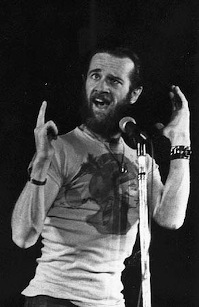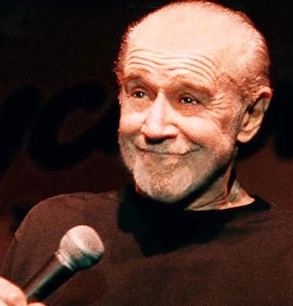George Carlin: May 12, 1937 to June 22, 2008
23/06/08 06:44


Note to readers: George Carlin's death Sunday of heart failure ended his oft-stormy reign as the fiercely independent elder statesman of take-no-prisoners comedy.
His comedy roots date to a radio deejay job in Fort Worth, where he met and teamed with Jack Burns. They left for Hollywood in 1960 and broke up two years later. Carlin branched out on his own, initially in a clean-cut guise as the "Hippy Dippy Weatherman." But by the late 1960s, he had grown a beard, long hair and was spouting his famed "Seven Words You Can Never Say on TV."
Those words got him arrested during a famed 1972 "Summerfest" concert performance in Milwaukee. He was charged with disturbing the peace, but a Wisconsin judge threw the case out of court.
Carlin, ever unrepentant, went on to make a record 14 comedy specials for HBO and also hosted the first episode of Saturday Night Live on Oct. 11, 1975.
The below article originated that same year in the pages of the University of Wisconsin-Madison student newspaper The Daily Cardinal. It includes both a review of Carlin's performance and a still unforgettable interview with him backstage. Warning: the article contains some hard-core profanity that we somehow managed to get in the paper 33 years ago. It's all being left in because obviously Carlin would have wanted it that way. It's who he was.
By ED BARK
George Carlin is the only comedian around who can do 10 minutes on farting -- and walk away smelling like a rose.
"Did you ever notice that your own farts smell OK?"
"It's just exhaust. We're not perfected yet."
"You know you really like your neighbor or your partner when you're willing to fart out loud."
Does he have to talk that way? Why does he say those things?
Well, Carlin's just warming up. But let him explain. It's backstage at Madison's Dane County Coliseum, where Carlin has just reimbursed 3,000 souls who paid him to make them laugh long and hard.
"Anything we all do and never mention, I think is funny, ya know? It can be anything totally universal which is practically completely ignored in conversation. When the spark jumps between those two, it's magic. It produces laughter because it's a surprise."
This of course is not Al Sleet, the Hippy Dippy Weatherman talking. Or sportscaster Biff Barf. Or Willie Wise, the wonderful WINO disc jockey. Carlin "doesn't hang out with them anymore." He shucked the show lounge scene after undergoing a late-sixties metamorphosis.
"Those places died in 1945 and they forgot to lie down," he says. "I was just sick to my stomach of wearing the dumb tuxedo and entertaining middle class morons."
So tonight Carlin wears a captioned t-shirt ("On the back of this shirt is a true statement." Flipside: "On the front of this shirt is a false statement.") and matching blue jeans. He says he was 16 in '53. He looks 50 in '75. His forehead is plowed with deep furrows. Old gray hair ain't what it used to be a few years back. He wears rimless glasses offstage, the same kind the nuns who taught him at New York's Corpus Christi grammar school used to wear.
And he now "looks at the world at a 45 degree angle." From that perspective, you examine things a little closer. You look at things a lot differently.
"Snot's funny. The original rubber cement, ya know. Ya can't get rid of it."
"What do dogs do on their day off? They can't lie around. That's their job."
"In New York subways, it's a $50 fine for spitting. Vomiting is free."
Carlin onstage is a mixture of improvisation and oft-told bits. He's got rhythm on the brain. If something doesn't go just right, he'll cue the audience: "I didn't have the right rhythm on that one."
He'll dig a grave for himself occasionally; sometimes you're not quit sure whether he'll bail out. But he always does. And when he's really rollin', he leaves 'em laughin' -- hard.
"You know yourself that when you're telling a story to someone, and they laugh, you're thinking why they're laughing," Carlin says. "That's the logical way to entertain. So with that in mind, with a long laugh from an audience, when you're struttin' a little bit, if you're articulate that night, that's when you have fun improvising. Same paint box. Different paint."
Thinking on your feet. That's something alien to national institutions like Bob Hope and the late Jack Benny.
Carlin says Hope "doesn't have the soul of a humorist. He's a fascist. I'm glad he learned how to make wisecracks. But I don't think he ever had any original ideas.
"Some performers don't write or conceive of things. They're joke tellers and laugh getters. They draw from a sort of public domain pool of jokes. Some them are just better than others at it."
Jack Benny's predictable routines were "okay for their time. He was cheap, he was 39 forever, he had great delivery and knew which jokes to reject. But I don't think he was a humorist."
Some of Carlin's "heroes" are Danny Kaye, Ernie Kovacs, Steve Allen ("when he was really trying and using his brain"), the Marx Brothers, Ritz Brothers, Bob Newhart ("at his best in the beginning") and the catalyst, Lenny Bruce.
Like Lenny Bruce, Carlin is fascinated with words and names. He loves to play with them and twist their meaning out of shape.
"Names. They mean something. For instance, you wouldn't buy Goodyear pancakes. No one wants those. You wouldn't want Aunt Jemima tires for the same reason. If Janitor in a Drum made a douche, nobody'd buy it."
He explores the inside/underside of mass fascination in exhaustive detail. As did Lenny Bruce. Football and baseball, for instance. Have you ever looked at them this way?
"Woody Hayes is weird. He wears a baseball hat during football games. Can you imagine if Walter Alston wore a football helmet during a baseball game? They'd take him away in a wire truck."
"Football is a ground acquisition game. You beat the shit out of 11 guys and take their land away from them. 'Course you only do it 10 yards at a time. That's the way we handled the Indians, right? First down in Pennsylvania, Midwest to go."
"The language of football and baseball tells it all. Football is technological. Baseball is pastoral. Football is played on an enclosed grid. Baseball is played on an ever-widening diamond reaching into infinity."
"In football you have the hit, clip, block, crackback, the tackle, the blitz, the bomb, the offense, the defense. In baseball, you have the sacrifice."
Carlin is into drugs, although less so now. So, tragically, was Lenny Bruce.
"I was a pot smoker since I was 13," Carlin says. "At 21, stoned habitue. It's a permanent value changer. If you smoked only for a week when you were 16, and you thought about a lot of shit during that week, and you never smoked again, you'd be making decisions at 48 that would be somewhat different. I believe that."
Prior to the transformation, he took "just about the right amount of acid to make the changes that it can help many people make."
But it's Carlin's hit-over-the-head usage of "dirty" words that evokes the most vivid comparisons. Lenny Bruce paved the way and paid with his psyche. For Carlin, the roadwork is not yet finished. He's expanding his list of "seven dirty words you can't say on TV."
"I added fart, turd and twot. These three, of course, were the only ones selected this year and inducted into the Hall of Fame, as it were. We're inspecting all of them. Dingleberry almost made it this year."
And the grand finale. It's Carlin's crusade. Or so it seems.
"The person who thought up the slogan, 'Make Love, Not War,' . . . his job was over that day. He could've retired at that moment. If it would've been me, I would've walked away. So long, I'm goin' to the beach. You guys work it out."
"Now I have a slogan, too. It's not as euphonious. It doesn't roll off the tongue. It's 'Make Fuck, Not Kill.' Substitute the word 'fuck' for the word 'kill' in all of our writings. I'd love to see it. Just for awhile. Just for a year or so. And we would change."
"Ya know, they tell me society sucks. I wish they'd get started."
Carlin won't do "college circuit" comedy forever. It's a drain; sometimes you don't know if your rap is making sense. Video beckons.
"If you're a storyteller, you've gotta try all the ways, that's all," he says. "Adding a soundtrack and putting in a monster screen, and being able to edit it . . . you oughta be able to do good stories. I gotta find that out."
Whatever happens, whatever Carlin does, he'll remain an intensely human specimen, shot full of the heightened insecurities and paranoia that plague every standup comic. Sometimes they surface, as they did outside the Coliseum.
A frail figure runs toward us. It's Carlin.
"Hey, before you leave, I just wanna ask you something. Did I sound like I was full of shit? Ya know, sometimes, after I've been talking for a long time . . ."
